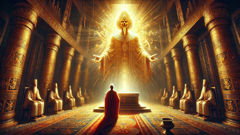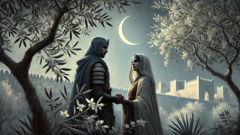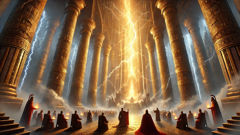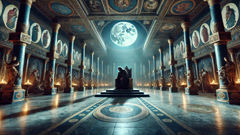Introduction
In the waning days of Ugarit’s splendor, when its sun-baked stones gleamed along the Mediterranean’s restless edge and priests whispered prayers to the gods atop terraced temples, there lived a king whose tale echoed beyond the walls of his city. Keret—his name spoken in reverence and pity—was a ruler both blessed and cursed. Crowned by birth, his every word shaped the fate of his people, yet the weight of sorrow pressed upon his shoulders like the leaden clouds gathering over the Baal mountains. Years of prosperity had filled his palace with laughter, music, and the scent of cedar oil. Children’s voices once rang through opulent halls, and his queen’s gentle wisdom soothed the hearts of all who came before her. But fate is fickle, and even kings are not spared its cruel hand. Pestilence swept through Ugarit, taking first his beloved wife, then, in a cruel succession, every one of his children. Gone was the promise of heirs to continue the line of Keret; gone, too, was the warmth that made his house a home. The mighty king sat in his chamber, surrounded by riches that meant nothing, his soul hollowed by loss. His people mourned with him—watchful, anxious, for the land’s prosperity and Keret’s spirit were entwined. What becomes of a king who has lost all? In the city’s sanctuaries, prayers rose like incense for renewal, for a sign that Ugarit’s light would not be extinguished. And so begins the legend: the story of a king undone by grief, who would—by the mysterious favor of the high god El—journey through hardship, temptation, and despair to find hope once more. This is not merely a tale of adventure, but a woven tapestry of longing, faith, and the stubborn will to persevere. As the sun sets behind the temples, casting long shadows across the land, the name of Keret still lingers—etched into memory, reminding us that even in the darkest hour, new beginnings may be granted to those who endure.
A King’s Sorrow and the Whisper of Dreams
Night after night, Keret wandered the silent corridors of his palace, each step echoing memories of the laughter and warmth that once filled these stones. His counselors watched helplessly, seeing how loss had hollowed the once-mighty king. The city below felt the change—Ugarit’s markets grew quiet, and the fields surrounding its walls yielded thin harvests. The gods seemed distant, their blessings receding like the tide. Yet, the people clung to hope, believing that fate, so cruel in its taking, might one day return what it had stolen.

One evening, as a heavy wind rattled the lattice windows and the flickering flames of oil lamps danced in the gloom, Keret knelt before his household altar. He did not speak; his prayers had run dry. Instead, he gazed up at the carved image of El, the high god of the Ugaritic pantheon—lord of wisdom and creation. His mind drifted between waking and sleep, and at the threshold of dreams, a presence descended: vast, gentle, and terrible in its power. Keret felt himself lifted, weightless as a feather, drawn into a vision.
In the vision, the halls of his palace were transformed. Light poured in like molten gold, banishing every shadow. The voice of El spoke—not with sound, but with meaning that filled Keret’s spirit: “Why do you mourn so deeply, King of Ugarit? Do you not know that even the greatest must taste sorrow?”
Keret replied, “I have lost my wife and all my children. My line will end, and my city will perish with me. What hope remains?”
El’s presence grew even more immense, yet soothing. “Despair is a shadow, but beyond it lies dawn. I shall grant you guidance. Journey to Udum, beyond the desert, where the daughter of King Pubala waits. There you will find your new wife, and through her, hope will be restored to Ugarit.”
The vision faded. Keret awoke on the cold stone floor, tears drying on his cheeks. A sense of purpose—so long absent—stirred in his chest. He summoned his chief counselor, Yasib, at dawn. “Prepare the horses and gather provisions,” Keret commanded, his voice gaining strength with each word. “I must journey far, beyond the land of my fathers.”
Whispers spread throughout the palace and city as news of the king’s planned departure reached every ear. Some feared for his safety—others, for the kingdom’s fate in his absence. But Keret was resolute. He donned the ceremonial garb of his ancestors—embroidered linen, a bronze circlet upon his brow—and rode out from Ugarit’s great gate with a small company of trusted men.
The journey across the desert was punishing. Days burned with relentless sun; nights froze beneath a sky crowded with unfamiliar stars. Sandstorms battered the travelers, and at times, despair threatened to smother Keret’s fragile hope. Yet the memory of El’s words and the vision’s golden promise drove him onward. In moments of doubt, he would close his eyes and hear the echo: "Beyond despair lies dawn."
On the seventh day, the horizon revealed distant hills. There, among olive groves and the scent of myrrh, stood the city of Udum—its white-walled citadel gleaming beneath the late afternoon sun. Keret’s arrival caused a stir; strangers were rare, and the king’s retinue, weary but proud, drew curious eyes as they entered the gates. King Pubala received them in his audience hall—a space grand but more modest than Ugarit’s palaces. After formal greetings and the exchange of gifts, Keret revealed his purpose.
“I have come, guided by the will of El, to seek your daughter’s hand. Through union with her, I hope to restore what I have lost and secure the future of my people.”
Pubala hesitated, torn between tradition, fear, and awe at El’s supposed favor. He called for his daughter—Hurraya, whose beauty and intelligence were known far beyond Udum’s borders. When Hurraya entered, her eyes—deep as the night sky—met Keret’s. She listened as he spoke of his journey and sorrow, her gaze never wavering. In that moment, a bond formed between them—born not of duty, but shared understanding of grief and the longing for hope.
A great feast was held in Udum’s honor. Yet even as music filled the air and torches blazed, not everyone wished the union well. Jealous courtiers whispered, and distant enemies heard rumors that Ugarit’s king sought to rebuild his line. In the coming days, Keret would need every ounce of wisdom and resolve to fulfill the promise given by El, for not all who walk in the light escape the pull of darkness.
Journeys of the Heart and Trials of Fate
Keret’s days in Udum were filled with both hope and tension. King Pubala welcomed him with hospitality, yet the air bristled with unease. Old alliances and rivalries simmered beneath polite words. Some courtiers regarded Keret with suspicion; others, seeing the hand of destiny at work, pressed him for favors. Amidst this political web, Hurraya revealed herself to be more than a prize—her wisdom matched her beauty. She spoke to Keret in quiet gardens, sharing tales of Udum’s history and her dreams for a life beyond gilded walls.

A formal betrothal was arranged, to be sealed by sacred rites before the high god El. But as preparations advanced, word reached Udum of a rival king—Yabni of Hatar—who coveted Hurraya for himself. Yabni’s messengers arrived with veiled threats and lavish gifts, seeking to sway Pubala or, failing that, to sow discord among Udum’s people. Pubala was torn. To refuse Yabni risked war; to grant him Hurraya would break faith with Keret—and perhaps incur El’s wrath. The city’s elders debated deep into the night.
Amid this uncertainty, Keret found himself drawn to Hurraya’s strength. One evening in the moonlit olive groves, she took his hand. “I am not afraid,” she said softly. “Fate has brought us together, and I trust in the gods.” Her words bolstered Keret’s resolve. He swore by El’s name to protect her and to honor the promise that had brought him across the desert.
The night before the wedding, as Udum slumbered, saboteurs loyal to Yabni infiltrated the city. Fires broke out near the citadel gates. Keret, roused by the commotion, rushed to defend Pubala’s household. In the chaos, he faced Yabni’s hired swords—men as desperate as they were ruthless. The battle in Udum’s shadowed streets was fierce. Keret fought with the tenacity of one who had lost everything and would lose no more.
Blood mingled with dust as dawn broke. With Yasib at his side, Keret repelled the attackers. He took a wound to the arm but stood unbowed as the fires were quenched and the threat driven off. The people of Udum, witnessing his valor, rallied to his side. Pubala, seeing Keret’s loyalty and courage, set aside doubt. The sacred rites proceeded at dawn.
Before El’s altar, Keret and Hurraya were joined in marriage. Priests intoned blessings as golden incense drifted on the breeze. In that moment, Keret felt the weight of sorrow lift—a new beginning unfolding beneath the eyes of gods and men. The union was celebrated with feasting and song. Yet as Keret prepared to return to Ugarit with his bride, a sense of foreboding lingered. Enemies had been thwarted, but not vanquished. Yabni’s pride was wounded, and his hunger for revenge had only grown.
The journey back to Ugarit was fraught with peril. Yabni’s spies haunted their trail, and desert bandits—emboldened by rumors of royal travelers—struck at night. Hurraya proved her mettle, tending to the wounded and inspiring the weary with her calm resolve. Keret pressed on, ever mindful of his duty to both his new wife and his waiting people.
At last, after weeks of hardship, the towers of Ugarit appeared on the horizon. The city erupted in joy at their return. Flowers were strewn along the streets, and the people sang praises to El for delivering their king. The palace was alive once more—music echoing beneath high ceilings, children’s laughter returning to the gardens as Hurraya brought new hope to the royal household.
But trials yet remained. The gods’ favor is never won once and for all; it must be nurtured with gratitude and wisdom. Keret had regained what he lost, but now he faced new challenges: winning over the hearts of his people, healing old wounds, and guarding against the ever-present threat of Yabni’s wrath.
Restoration, Betrayal, and the Test of the Gods
Months passed in Ugarit, and the city flourished as if awakened from a long slumber. Hurraya’s presence brought not just comfort to Keret but renewal to his people. She walked among the city’s artisans and farmers, listening to their troubles and dispensing practical advice. The royal gardens bloomed with new life, and soon Hurraya’s pregnancy was announced—a sign to all that El’s blessing truly rested on the house of Keret.

Yet not all hearts were gladdened by these changes. Among Keret’s own kin lurked jealousy and ambition. His younger brother, Hasiru, embittered by years in the king’s shadow and resentful that the line of succession had shifted anew, began to plot in secret. Whispers grew in dark corners—some claimed that Keret’s favor with El was mere myth; others wondered if Hurraya was truly worthy to be queen.
As Hurraya’s time drew near, omens troubled the city. A blood-red moon rose over the sea, and flocks of birds scattered in fear. The palace priests interpreted these signs as warnings: the gods demanded vigilance and sacrifice lest Ugarit’s prosperity be snatched away.
Hasiru seized the moment. He gathered discontented nobles and offered them a vision of a new order—with himself on the throne. One night, as a storm lashed the city, Hasiru attempted his coup. Loyal guards clashed with traitors in the palace corridors. Keret was caught unprepared but fought fiercely, spurred by the memory of all he had lost before.
The struggle raged through the night. At its height, Hasiru cornered Keret in the temple precincts, where the king knelt before El’s altar. Desperation gave Keret strength. He called upon El—not for vengeance, but for guidance and protection for his people and unborn child.
Thunder split the sky. In that moment, legend says, El intervened. Lightning struck the temple roof, sending shards of stone raining down between Keret and Hasiru. The conspirators fled in terror. When dawn broke, Hasiru was found among the ruins—alive, but shaken to his core. He knelt before Keret and begged forgiveness, renouncing all claim to the throne.
Peace returned to Ugarit. Hurraya gave birth to a healthy son—a new heir for Keret’s line. The city rejoiced, and even Hasiru found a place at his brother’s side, chastened but grateful for mercy. El’s favor was honored with sacrifices and festivals that filled the city with light and song.
Yet Keret never forgot the lessons of his trials. He ruled with humility, remembering how swiftly joy can be swept away, and how precious are the gifts restored by perseverance. In later years, stories of his journey—of loss, endurance, and divine grace—were told around hearths and in temples, passed down from father to son and mother to daughter. The legend became not just a memory but a guide: a reminder that hope is found not in unbroken fortune, but in the courage to seek new beginnings when all seems lost.
Conclusion
The legend of Keret lingers like incense on the evening breeze—a tale woven from grief and hope, trial and triumph. His journey reminds us that kings are shaped not merely by lineage or conquest, but by their endurance in the face of sorrow. Keret’s willingness to heed the call of the divine, to venture into unknown lands for love and renewal, became the seed from which Ugarit’s future blossomed. His humility in victory, his mercy toward betrayers, and his steadfast devotion to both his family and his people set a standard for rulers and dreamers alike. In the faded murals of ancient palaces and the whispered prayers in modern hearts, Keret endures—not as a figure untouched by pain, but as one who walked through darkness and found dawn awaiting him. The legend endures not for its grandeur alone, but for its promise: that perseverance, faith, and love can carry us beyond the boundaries of loss into a world remade by hope.













